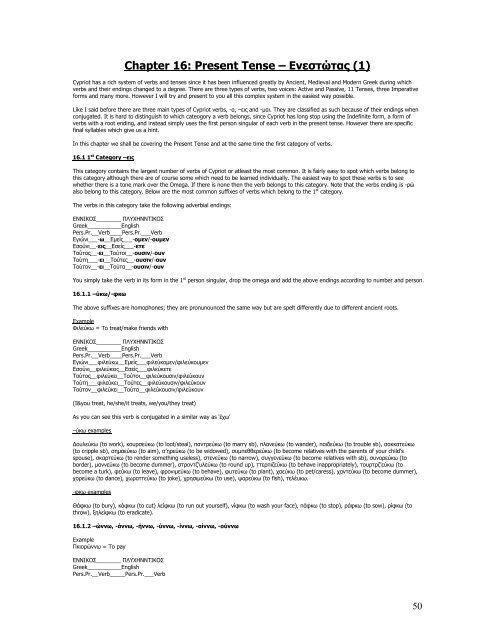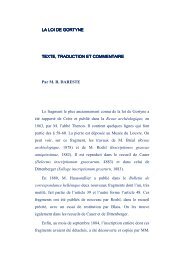CYPRIOT GRAMMAR
CYPRIOT GRAMMAR
CYPRIOT GRAMMAR
Create successful ePaper yourself
Turn your PDF publications into a flip-book with our unique Google optimized e-Paper software.
Chapter 16: Present Tense – Ενεστώτας (1)<br />
Cypriot has a rich system of verbs and tenses since it has been influenced greatly by Ancient, Medieval and Modern Greek during which<br />
verbs and their endings changed to a degree. There are three types of verbs, two voices: Active and Passive, 11 Tenses, three Imperative<br />
forms and many more. However I will try and present to you all this complex system in the easiest way possible.<br />
Like I said before there are three main types of Cypriot verbs, -α, –εις and -μαι. They are classified as such because of their endings when<br />
conjugated. It is hard to distinguish to which cateogory a verb belongs, since Cypriot has long stop using the Indefinite form, a form of<br />
verbs with a root ending, and instead simply uses the first person singular of each verb in the present tense. However there are specific<br />
final syllables which give us a hint.<br />
In this chapter we shall be covering the Present Tense and at the same time the first category of verbs.<br />
16.1 1 st Category –εις<br />
This category contains the largest number of verbs of Cypriot or atleast the most common. It is fairly easy to spot which verbs belong to<br />
this category although there are of course some which need to be learned individually. The easiest way to spot these verbs is to see<br />
whether there is a tone mark over the Omega. If there is none then the verb belongs to this category. Note that the verbs ending is -ρώ<br />
also belong to this category. Below are the most common suffixes of verbs which belong to the 1 st category.<br />
The verbs in this category take the following adverbial endings:<br />
ΕΝΝΙΚΟΣ________ ΠΛΥΧΗΝΝΤΙΚΟΣ<br />
Greek___________English<br />
Pers.Pr.__Verb____Pers.Pr.___Verb<br />
Εγιώνι___-ω__Εμείς___-ομεν/-ουμεν<br />
Εσούνι__-εις__Εσείς___-ετε<br />
Τούτος__-ει__Τούτοι__-ουσιν/-ουν<br />
Τούτη___-ει__Τούτες__-ουσιν/-ουν<br />
Τούτον__-ει__Τούτα__-ουσιν/-ουν<br />
You simply take the verb in its form in the 1 st person singular, drop the omega and add the above endings according to number and person.<br />
16.1.1 –ύκω/-φκω<br />
The above suffixes are homophones; they are pronunounced the same way but are spelt differently due to different ancient roots.<br />
Example<br />
Φιλεύκω = To treat/make friends with<br />
ΕΝΝΙΚΟΣ________ ΠΛΥΧΗΝΝΤΙΚΟΣ<br />
Greek___________English<br />
Pers.Pr.__Verb____Pers.Pr.___Verb<br />
Εγιώνι___φιλεύκω__Εμείς___φιλεύκομεν/φιλεύκουμεν<br />
Εσούνι__φιλεύκεις__Εσείς___φιλεύκετε<br />
Τούτος__φιλεύκει__Τούτοι__φιλεύκουσιν/φιλεύκουν<br />
Τούτη___φιλεύκει__Τούτες__φιλεύκουσιν/φιλεύκουν<br />
Τούτον__φιλεύκει__Τούτα__φιλεύκουσιν/φιλεύκουν<br />
(I&you treat, he/she/it treats, we/you/they treat)<br />
As you can see this verb is conjugated in a similar way as ‘έχω’<br />
–ύκω examples<br />
Δουλεύκω (to work), κουρσεύκω (to loot/steal), παντρεύκω (to marry sb), πλανεύκω (to wander), παιδεύκω (to trouble sb), σακκατεύκω<br />
(to cripple sb), σημαεύκω (to aim), σ’ηρεύκω (to be widowed), συμπεθθερεύκω (to become relatives with the parents of your child’s<br />
spouse), σκαρτεύκω (to render something useless), στενεύκω (to narrow), συγγενεύκω (to become relatives with sb), συνορεύκω (to<br />
border), μαννεύκω (to become dummer), στροντζ’υλεύκω (to round up), ττερπιζεύκω (to behave inappropriately), τουρτρζ’εύκω (to<br />
become a turk), φεύκω (to leave), φρονιμεύκω (to behave), φυτεύκω (to plant), χαεύκω (to pet/caress), χαντεύκω (to become dummer),<br />
χορεύκω (to dance), χωραττεύκω (to joke), χρησιμεύκω (to use), ψαρεύκω (to fish), τελέυκω.<br />
-φκω examples<br />
Θάφκω (to bury), κόφκω (to cut) λείφκω (to run out yourself), νίφκω (to wash your face), πάφκω (to stop), ράφκω (to sow), ρίφκω (to<br />
throw), ξηλείφκω (to eradicate).<br />
16.1.2 –ώννω, -άννω, -ήννω, -ύννω, -ίννω, -αίννω, -ούννω<br />
Example<br />
Πκιορώννω = To pay<br />
ΕΝΝΙΚΟΣ________ ΠΛΥΧΗΝΝΤΙΚΟΣ<br />
Greek___________English<br />
Pers.Pr.__Verb_____Pers.Pr.___Verb<br />
50





